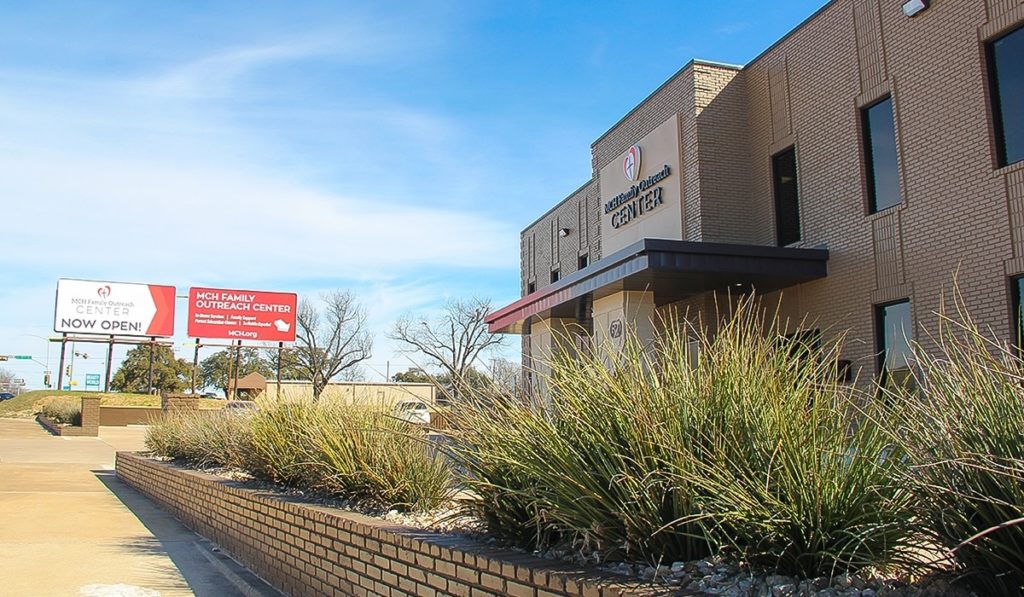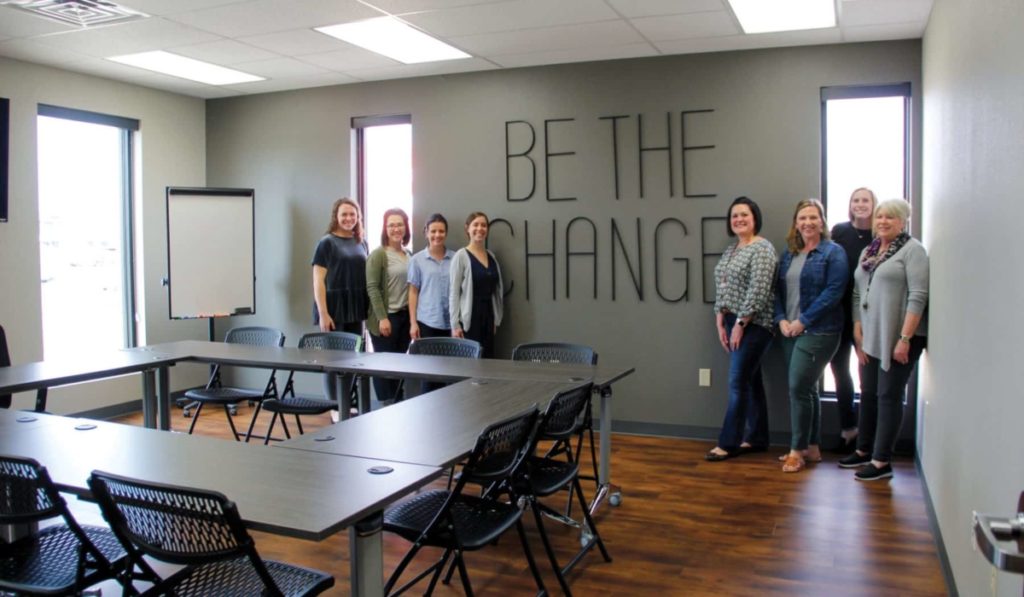by Alexis Christensen
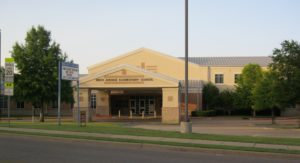 I have the privilege to work with three elementary schools within Waco ISD. They each have their unique strengths and challenges. Today though, I’m highlighting one campus in particular, West Avenue Elementary, located in the heart of North Waco on 15th Street.
I have the privilege to work with three elementary schools within Waco ISD. They each have their unique strengths and challenges. Today though, I’m highlighting one campus in particular, West Avenue Elementary, located in the heart of North Waco on 15th Street.
Waco Community Development began partnering with West Avenue in 2007. We started simply by asking people questions about their dreams and visions for their neighborhood and actively listened to their responses. Out of those conversations, our Family Engagement Program began. Today, when I ask people to describe what North Waco and West Avenue were like back then, I get responses like, “tore up” and “lots of prostitution and drug dealers” and “couldn’t see the good because of the bad.” When you looked at the neighborhood by the numbers during that time, it’s easy to see why people described their neighborhood like that. In 2009, there were 22 vacant retail/business spaces, 190 vacant residential lots, a poverty rate of 43%, and only 35% of residents were homeowners (NRS, 2009 & Census Bureau, 2000).
Yet, since the 2007-2008 school year, West Avenue has been rated by the Texas Education Agency (TEA) as Recognized, Academically Acceptable and Met Standard. And more recently, an assessment conducted by Waco ISD monitoring children’s Pre-Kindergarten readiness showed that West Avenue students were among the most ready to learn among their peers (CLI Engage Assessment). I believe it is worthwhile to take a deeper look at a few factors that helped lay the foundation for West Avenue’s success.
- In its fourteen year history, West Avenue has had 2 principals.
Andreia Foster was the first principal when the campus opened in 2002. Her “open door policy” allowed Waco Community Development and other organizations to work with students and families. Ms. Foster remained principal until 2014. Her twelve year tenure at a single campus created stability not only for families, but for the teaching staff as well.
Sheree Goodman, who taught at West Avenue for 10 years, agrees: “Low turnover [among staff] is connected to academic success, but we were more than co-workers, we became a family… a network was established. The staff was family-oriented and all stakeholders were included in every process. We always tried to do what was best for the kids; we truly believed in the students,” she said.
This legacy lives on through West Avenue’s “new” principal, Joseph Alexander, who just finished his second school year. Mr. Alexander’s motto is “No child is left behind at West Avenue.” This is demonstrated through his vigor and big dreams for his campus. He stated, “I want West Avenue to be a Blue Ribbon campus, a model for the State of Texas. Our students are the best in the state. We will do what other people say we can’t do with children from poverty. We believe that children can learn and will learn if given opportunity to be successful.”
These beliefs and core values both inspire and motivate students and teachers to be the best.
- Residents and community organizations are committed for the long haul.
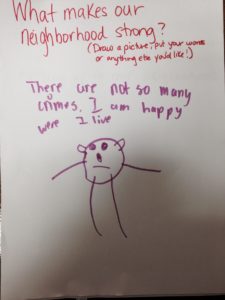 North Waco residents are not shy about their love for their neighborhood. An abundance of committed and trusted organizations and people live, work, worship and play in the neighborhood on a consistent basis. I would be remiss to try and name them all here; however, I’ve observed two main characteristics which distinguish these groups from others: their sustained commitment to learning from varying experiences and perspectives, and their deep held belief that trust is not a right due to them because of good intentions, but trust is a privilege to be earned. These practices are not cultivated overnight but develop with time.
North Waco residents are not shy about their love for their neighborhood. An abundance of committed and trusted organizations and people live, work, worship and play in the neighborhood on a consistent basis. I would be remiss to try and name them all here; however, I’ve observed two main characteristics which distinguish these groups from others: their sustained commitment to learning from varying experiences and perspectives, and their deep held belief that trust is not a right due to them because of good intentions, but trust is a privilege to be earned. These practices are not cultivated overnight but develop with time.
- Homeownership is growing in North Waco.
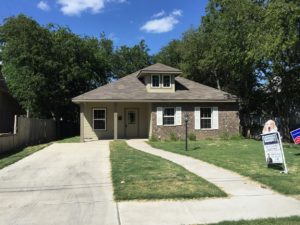 Homeownership is a major factor in creating neighborhood stability. A growing body of research points out that homeownership has the potential to positively impact educational goals.
Homeownership is a major factor in creating neighborhood stability. A growing body of research points out that homeownership has the potential to positively impact educational goals.
“Affordable and sustainable forms of homeownership can also help families achieve long-term stability. Research on the connection between homeownership and children’s education has found that homeowners tend to move less frequently than renters and that this may account for part of the difference in educational outcomes between children of homeowners and children of renters” (Holupka, C. Scott and Sandra J. Newman. 2010).
Waco Community Development was created with the lofty and ever galvanizing mission to inspire and cultivate healthy neighborhoods. In 2001, we joined the ranks of housing entities like Waco Habitat for Humanity and NeighborWorks who strived to create a culture of homeownership. For us, working within a geographically defined area proved to be a successful model. Today, the homeownership rate in Census Tract 12 (North Waco area) is 42%, an increase of approximately 7 percentage points from the 2009 sample data (Census 2014). We have seen vested homeowners become PTA officers, volunteers and mentors for students at West Avenue. One such Waco Community Development homeowner not only became the PTA Treasurer, but her son was valedictorian of his 5th grade class last May.
The complexity of factors influencing neighborhood development can make it difficult to understand what particular cause created a particular effect. There are schools of thought that believe this to be a negative thing, but I see a positive in the midst of the murkiness: It allows people and organizations to be interdependent when tackling difficult issues within our communities. It doesn’t excuse us from critically evaluating our work or from pursuing excellence; it simply means we have the opportunity to reach out to partners all around us to create even greater positive impact.
West Avenue has learned to lean on and be leaned upon and I think that’s a piece of why it’s experiencing such great success. Former teacher Ms. Goodman said it best, “The school is still a pillar. People know they can go there for anything they need and the partners have become resources for both the community and the school.”
 Alexis Christensen is a Community Organizer at Waco Community Development Corporation (Waco CDC) where she focuses on community building, leadership development and building collaborations.
Alexis Christensen is a Community Organizer at Waco Community Development Corporation (Waco CDC) where she focuses on community building, leadership development and building collaborations.
The Act Locally Waco blog publishes posts with a connection to these aspirations for Waco. If you are interested in writing for the Act Locally Waco Blog, please email ashleyt@actlocallywaco.org for more information.
By Alexis Christensen
I’ve long been drawn to understanding how governmental systems work—whether it’s politics, civic engagement or policy. Often we think about law or policies from an impersonal perspective, but in reality, they can be very personal.
In Part One of this series we learned about the devastating effects payday and auto title lending has on our residents and our city. Because of the negative outcomes produced by these loans, many believe now is the time for action. In the world of community development, the grassroots movement becomes effective in creating change when community members who have experienced, dealt with or struggled through the situation voice their personal stories and ideas into the work.
So let us turn to the voices of the community, who have dealt with the negative effects of payday and auto title lending firsthand. For a moment, let us listen to the voices of experience.
Ms. Lewis, tell us your story.
Lewis: I am a single parent of two kids. My son is 17 years old and chronically ill and I have a 19 year old daughter in college. I got into desperate times and needed money due to my financial situation. I have to travel a lot with my son [to visit doctors]. He requires medicines through IV and has frequent doctor visits. Then I found out my daughter had medical issues too. I kept seeing all these ads and signs, so I went and got an auto title loan.
Christensen: How was that visit?
Lewis: Well, when I got the loan they made me feel so comfortable and they were so friendly but come to find out they were wolves in sheep’s clothing. As a single parent, I am stressed. I am trying to keep up with the bills and sometimes it’s hard but I do what I can to manage. When it comes to payday lenders, yes they are so nice and sweet when you first come through the door but…I wish I had never done it because of the outrageous fees they charge with interest and the harassing calls…When my son was in the hospital, they called me just about every day threatening to come and take my car, it was awful.
Unfortunately, Ms. Lewis is not alone in her experiences with payday and auto title lending. Let’s hear from Mr. Thomas, who is a veteran.
Mr. Thomas, tell us your story.
Thomas: I was in school and temporarily unemployed and took out both an auto title loan and a payday loan to catch up on my water and electric bills and pay for school. I actually got a job in the same week I took out the auto title loan, but couldn’t keep up with the loan payments and had my pickup repossessed. The original loan was for $1,000 and the auto title loan was for $4,000. I’ve been charged twice the amount of the original loans.
I’ll be paying these type of loans off forever because of the interest. There is no way to catch up. Me and my wife are currently trying to adopt our nieces and credit issues have come up as an issue [in the adoption process].
Lastly, let’s hear from Ms. Marks.
Marks: A long while ago I got an auto title loan for $500 and ended up paying $2400 on the whole thing. Loan interest rate was about 800%. I belonged to a credit union and explained situation and they bought out the auto title and payday loan.
It was so hard to get a loan anywhere else besides a payday loan place. The stores keep calling and asking about getting another loan. At [a local payday loan store] I got a loan for $150 and I’m on the way right now to pay $51 in fees today to extend it for two weeks and it won’t go toward principal. I have 6 months to pay it in full.
If I could change anything about them, lower the interest rate. They get away with it [high interest rates] because they say they’re not the lender and they can’t do anything about it.
These stories have come from people right here in our community. These brave ones have shared some of their most vulnerable moments with us to help see change happen at the local level. This is why the ordinance to help address the issues payday and auto title lending create is vitally important to our community. The ordinance is one part of the solution; we also need sound alternatives and education to see true systemic change. Find where you fit in this work and help create a flourishing Waco for all of us.
*Some names have been changed to protect the identity of the community members.
 Alexis Christensen is a Community Organizer at Waco Community Development Corporation (Waco CDC).
Alexis Christensen is a Community Organizer at Waco Community Development Corporation (Waco CDC).
(This post is one in a series on race titled “But Some of Us Are Brave.” The series includes posts from a diverse group of writers from our community. It takes a considerable amount of transparency and vulnerability for the contributors to this series to pen these posts and voice their experiences. We appreciate their courage, and we hope their willingness to be brave will spark some authentic community conversation on this sensitive and important topic. We hope you will read these posts thoughtfully and join the conversation by responding honestly and respectfully, and by sharing them with your friends and acquaintances. — ABT )
Dear Fear,
Normally I start a letter by asking how you are, but I don’t much care to ask how you are doing. Instead, I’ll get right to it: you’re really wreaking havoc in our communities and I’d like to see it stopped.
You are a bully. You like to push and prod. You coax us to think the worst about people, exaggerate stereotypes. A drop in the stomach when I see that man, that black man walking toward me. Fear, you urge us on.
Fear, you are not new to this job. No, your tactics were employed long ago to strip people of their identity, their pride, and their dignity. Slavery, Jim Crow, Segregation– I smell your stench in them all.
Your tactics have evolved. Even now, people are paralyzed from speaking or sharing because of you. Their words mangled and strangled because of your tight, tight grip.
Fear, you are not an excuse or cop out. We cannot blame you for the hate and enmity that exists between peoples. But you do cause us to pull away instead of drawing near to each other, which disables us from seeing the Beloved Community realized. We are then blind to the reality and beauty of each individual and the collective.
When we give you power, we allow you to destroy whole groups of people. Fear, you are no friend of mine.
But I know your secret. I know you flee at the first flicker of unity. You shrink back at the sight of common understanding. You groan under the weight of triumphant justice. And so, it’s really clear isn’t it? We can be victorious over you.
I’m saying goodbye. I have no time for you. You’ve ravaged too long the streets of Waco, the hearts of men and women, the dreams of little brown boys and girls.
I am a fool no longer.
I am joining hands with my sisters and brothers to dispel you. It takes more than some of us to be brave, I know that well. We need everyone to be brave so that our communities can be full of beautiful color and song again. We need to be brave so we can build and rebuild bridges long burned down.
Don’t bother looking for me again, fear, because I’ll be too busy walking free, hand in hand with my beloved community, working toward justice, peace and wholeness. And frankly, you’re not invited.
Most sincerely,
Alexis
 Alexis Christensen is a Community Organizer at Waco Community Development Corporation (Waco CDC).
Alexis Christensen is a Community Organizer at Waco Community Development Corporation (Waco CDC).
By Alexis Christensen
Do you feel that? The teetering over the edge, the earth-itself-is-shaking feeling? During the past few weeks, you may have felt many emotions—some crushed under the weight of tragedy, others overcome by confusion, anger and maybe hate; still others may have felt unmoved. The cries of our brothers and sisters in Ferguson, Cleveland, New York, and across the globe have reached my ears and I could not stay silent. I had to say something or I guess write something.
But let’s rewind. I did not start off ready to engage, oh no, I started out silent. Unable to express my feelings of sheer devastation and my own confusion, trying to figure out the facts, but knowing the facts did not have anything to do with the root issues and reasons Ferguson happened. Most of all, I didn’t want to talk. But, I was pulled from my silence by my lifegroup, a small group through my church, which meets weekly. The Tuesday after the grand jury’s decision about Mike Brown came and, I’ll be honest, I did not want to be at lifegroup. I did not want to share my sorrow, I didn’t want to explain it. But I went anyway and one of my co-leaders suggested that we have a time of prayer for Ferguson. “Oh Lord,” I thought. “What can I say? What can I even pray?” I struggled all day with what I wanted to share. The time arrived and I walked heavy-hearted into my friend’s house. My introspective thoughts began to swirl and I began to feel them taking me captive. I wanted to just sit there, silently, and leave as soon as possible. But my turn was coming. The heat rising in my flesh. Heart beating, mouth dry. At first, the words came out shaky, insecure but unrelenting. Then the tears, hot and slow. I prayed one of the most sincere prayers I’d prayed in a long time. I can’t remember the words, but afterwards I opened the floor for others to share. And do you know what happened? Something beautiful.
To my left and to my right men and women of all races, political leanings, and theology began crying out for our world. Tears came. Words failed. And it was beautiful.
One of my friends who works in the school system prayed for our schools to recognize the face of racism. Another friend prayed for the Church to awaken and step into their role as reconcilers and to strengthen its heart for the work. One of the most stirring words was from a friend who described Ferguson and all of the glass shards from broken windows being picked up and repaired into a mosaic heart. Powerful. I looked at each person around the room and felt a surge of renewed strength for the struggle. I left feeling alive and hopeful.
But the surge of strength did not stop there. Last Sunday, community activist Jenuine Poetess organized a time of reflection and poetry reading. Through spoken word, both old and young, black and white, shared their places of pain, confusion, and hope. They brought wisdom and refreshment to our city. Again, strength found me and I began to feel stirred again in hope.
Several people have asked me if I think Waco could be a Ferguson. The short answer is yes. Until we can talk about race, discrimination, systemic inequities and racial inequality without discounting the black experience, and until our institutions reflect our community, we are in line to see such reactions.
And yet, I am reminded of lyrics to one of my favorite worship songs called Wonder. Hauntingly sung, the lyrics are as follows:
May we never lose our wonder.
May we never lose our wonder.
Wide-eyed and mystified,
May we be just like a child
Staring at the beauty of our King.
There is something about child-like faith that opens doors, hearts and even strategy for change. In this holiday season, do not lose your wonder. Don’t be overcome by brokenness and injustice. Remember to be mystified by this great big world. Believe in the goodness of humanity. And in that space, make room for your own heart to be changed and transformed. Listen to people who have different opinions than you. Speak out. March, yell, cry, give a hug, or write a song. Those things make us human. Give yourself space to relinquish the role of judge and jury. Disconnect from media and connect to your own feelings and emotions about race and justice.
I don’t write things because I think I can change your mind. I write these things because I believe wholeness for our world is possible. It is okay to question yourself and to question God (He can handle it). It’s okay to be wrong too, to humble ourselves and see something in a different way. Being right is overrated anyway. Just hold tightly to that wonder and we will all see better days.
* This blog is dedicated to my lifegroup, a small group of friends who have transformed the way I look at life and God. Thank you for challenging and encouraging me to be me.
Source: Cook, Amanda. Wonder (Live) [Spontaneous]. Bethel Music. Bethel Music, 2014.
 This week’s Act Locally Waco blog post was written by Alexis Christensen, a Community Organizer at Waco Community Development Corporation (Waco CDC). Would you be interested in writing for the Act Locally Waco blog? If so, contact Ashleyt@actlocallywaco.org.
This week’s Act Locally Waco blog post was written by Alexis Christensen, a Community Organizer at Waco Community Development Corporation (Waco CDC). Would you be interested in writing for the Act Locally Waco blog? If so, contact Ashleyt@actlocallywaco.org.
The Act Locally Waco blog publishes posts with a connection to these aspirations for Waco. If you are interested in writing for the Act Locally Waco Blog, please email ashleyt@actlocallywaco.org for more information.
by Alexis Christensen
I’m starting this post knowing you might disagree with me, which makes it hard for me to express my thoughts on racism. I actually wrote an entirely different blog post to avoid writing this one. But, this cannot be avoided. Not if we are to move forward in our world, our city, and in our relationships. So, let’s take a breath, remember that we are all people with varied and real experiences, and move forward.
I recently learned a word that has helped me (and others around me) process my feelings about racism in America today. It’s called microaggression. Coined in the 1970’s by Chester Pierce, and broadened by Derald Sue Wing, microaggression refers the “quiet, often unintended slights— racist or sexist — that make a person feel underestimated on the basis of their color or gender.” These slights are everyday words, phrases, or adjectives used to describe people of color that perpetuate stereotypes and racial structures in our society. This isn’t hyper-sensitivity, anger, or bitterness. It’s about speaking up when people hurt and devalue others. As a black woman, I can think of countless examples of microagression. People I love and cherish have unknowingly caused pain. Comments as simple as “You probably like fried chicken too” to bigger ones like “You don’t talk/act like a black person.” Other friends have shared similar experiences, enduring comments such as “I’m glad you’re not an angry black woman” and “Your skin isn’t too dark.” These comments do not define black culture. They actually nullify a person’s self, creating ruptures in our view of the world. From experience, the best way to move forward is to break the silence.
That’s just what a group of black Harvard students did. Through a photo campaign called “I, Too Am Harvard” students joined together to share their experiences with microaggression. Their boldness to confront these everyday occurrences sent waves through the campus and the world. It gave confidence not only to the students, but to many in the black community who are told that white is right.
Breathe.
It also started dialogue. Dialogue is important because racism isn’t dead. It may be less blatant but it is alive and well, and if racism discussions become taboo, then we are losing. Personally, I try to avoid most things that produce tension and disharmony. But this conversation, this topic, has been growing inside of me, not only because I am black, but because of the work I do in the community. Conversations often amount to stuffing down emotions, numbing ourselves as a people, or giving up hope because we can’t afford to be misunderstood again. But I have a group of radically deep, intellectual, caring friends and family members who have nurtured and listened, and challenged me to lend my voice to the dialogue.
My hope, (I always hope), is that whoever you are, wherever you are, you will take Socrates’ advice to heart and know that “the unexamined life is not worth living.”
I’m asking you to live a life where ignorance of microaggression doesn’t equal bliss, and that you’ll lend your voice to the dialogue in your own way. I don’t have all the answers; heck, I’m a super complex person and cannot begin to tell you what to do. But I can offer a place to start. Let’s make this an ongoing discussion. Only through intentional conversation and examining our lives can we combat today’s brand racism. As we work and live in community, and as we believe for a better world, the more thought, effort, time and conversations we have, the greater openness we will see in our communities for all people. We will see greater unity and reconciliation in our lifetime, if we try.
Learn more about microaggression (Links I utilized in the writing of this post):
I, Too Am Harvard:
- http://itooamharvard.tumblr.com/
- http://www.nytimes.com/video/us/100000002769668/microaggressions-comments-that-sting.html?playlistId=100000002797598
- http://www.buzzfeed.com/alisonvingiano/21-black-harvard-students-share-their-experiences-through-a
Other Publications:
- http://www.nationalreview.com/article/370078/microaggression-alec-torres
- http://time.com/32618/microaggression-is-the-new-racism-on-campus/
- http://www.psychologytoday.com/blog/microaggressions-in-everyday-life/201010/racial-microaggressions-in-everyday-life
 This week’s Act Locally Waco blog post was written by Alexis Christensen, a Community Organizer at Waco Community Development Corporation (Waco CDC). Would you be interested in writing for the Act Locally Waco blog? If so, contact Ashleyt@actlocallywaco.org.
This week’s Act Locally Waco blog post was written by Alexis Christensen, a Community Organizer at Waco Community Development Corporation (Waco CDC). Would you be interested in writing for the Act Locally Waco blog? If so, contact Ashleyt@actlocallywaco.org.

